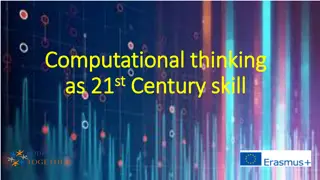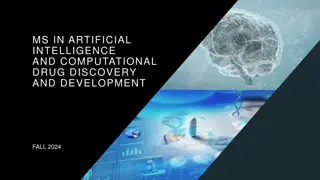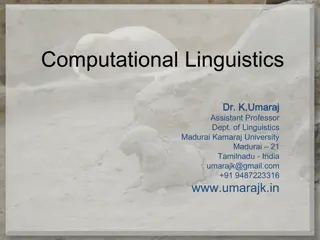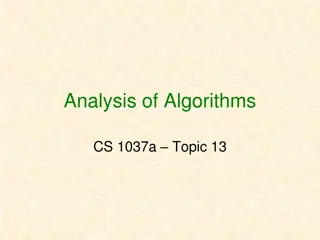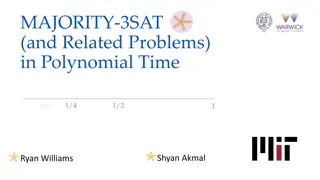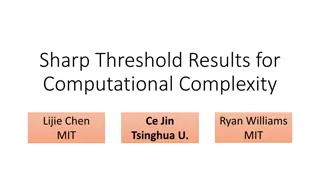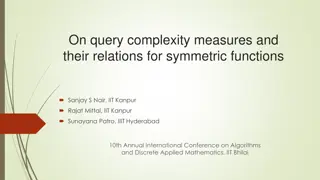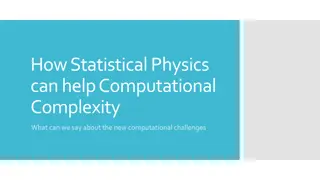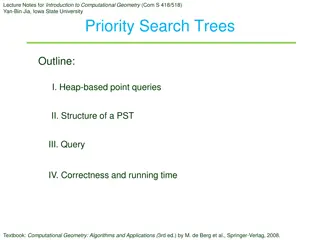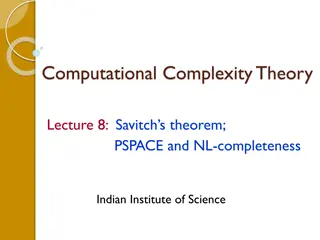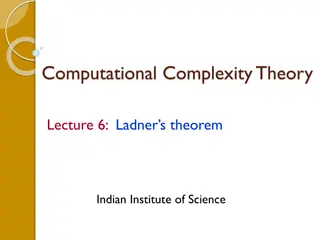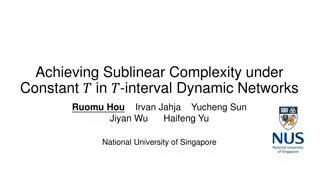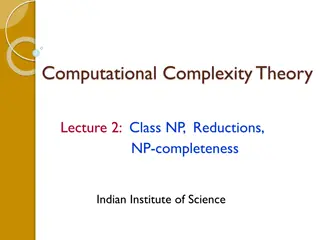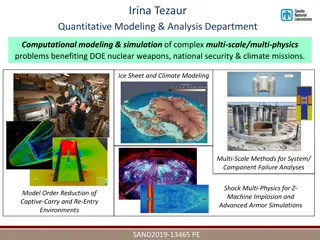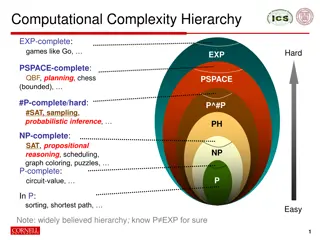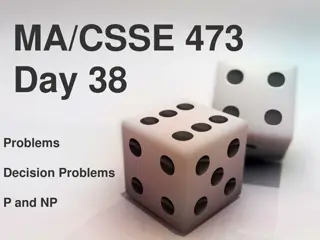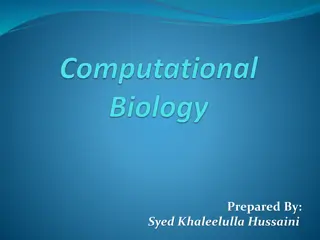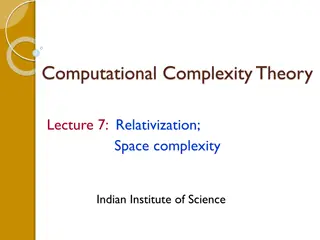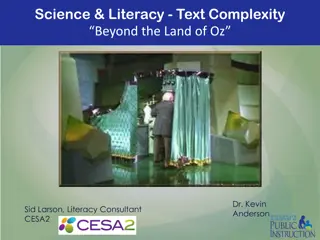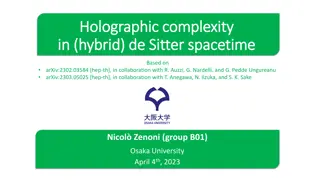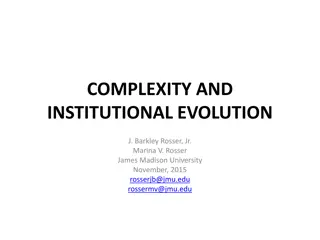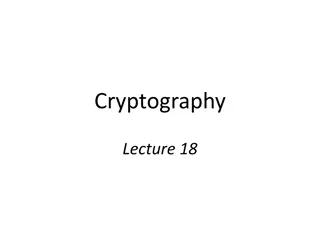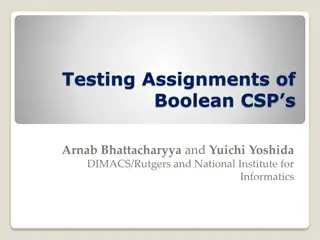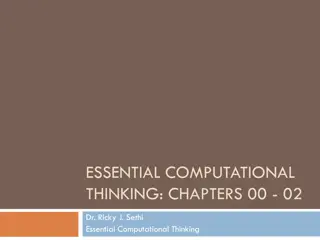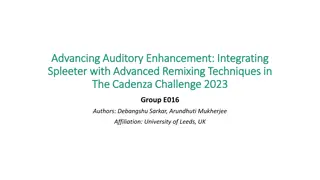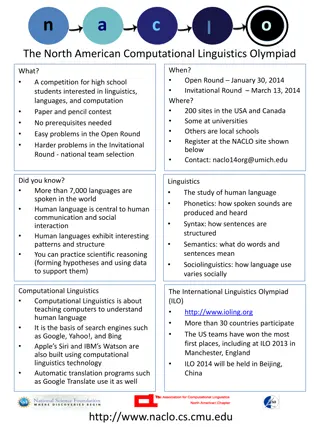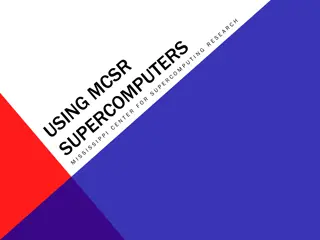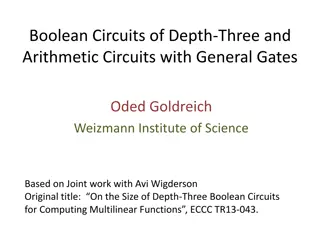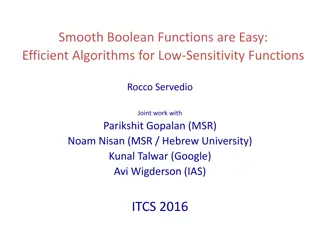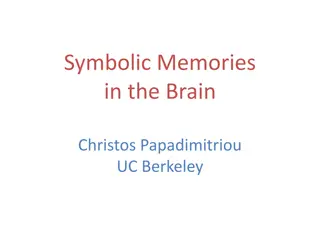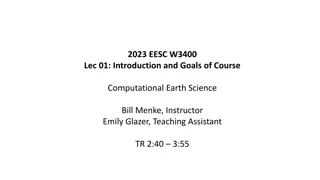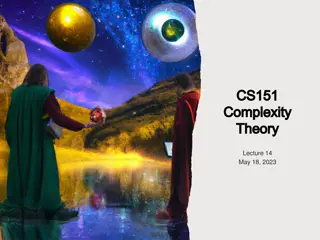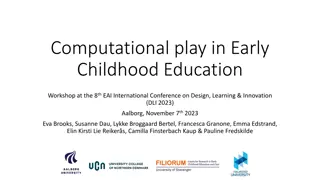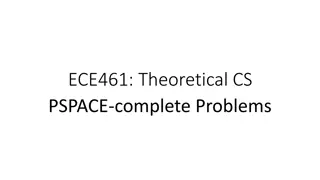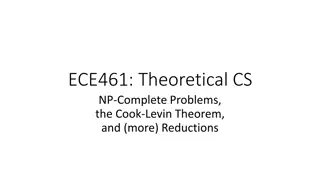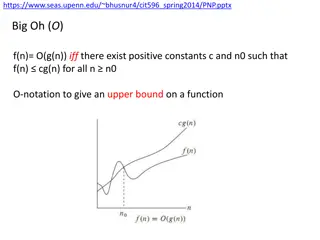Cryptographic Reductions and Learning in Computational Complexity
This lecture explores the connection between computational complexity and cryptography, focusing on topics like pseudorandom functions, public-key cryptography, and learning from Gaussians. It delves into the implications of cryptographic reductions, lower bounds for learning MLPs, and the existence
0 views • 22 slides
Computational thinking as 21st Century skill
Computational thinking is a critical skill for the digital age, involving problem-solving techniques that enable computers to process information effectively. It precedes programming and requires breaking down complex problems into manageable steps. Educators emphasize computational thinking exercis
7 views • 4 slides
Master's Program in Computational Drug Discovery and Development - Fall 2024 Curriculum
This Master's program offers a comprehensive curriculum focusing on Artificial Intelligence, Computational Drug Discovery, and Development. With a blend of cutting-edge technologies and practical applications, students delve into techniques, AI/ML, big data mining, modeling, and more. Through intens
1 views • 7 slides
Understanding Computational Linguistics and Natural Language Processing
Explore the fascinating fields of Computational Linguistics and Natural Language Processing (NLP), delving into their development, applications, and significance. Learn about the study of human languages in computational models, the importance of corpora in linguistic research, and the various types
1 views • 33 slides
Understanding Time Complexity in Algorithm Analysis
Explore the concept of time complexity in algorithm analysis, focusing on the efficiency of algorithms measured in terms of execution time and memory usage. Learn about different complexities such as constant time, linear, logarithmic, and exponential, as well as the importance of time complexity co
0 views • 73 slides
Understanding Complexity in Polynomial Time: MAJORITY-3SAT and Related Problems
Dive into the world of MAJORITY-3SAT and its related problems, exploring the complexity of CNF formulas and the satisfiability of assignments. Discover the intricacies of solving canonical NP-complete problems and the significance of variables in determining computational complexity.
3 views • 35 slides
Insights on Computational Complexity Threshold Results
Exploring the challenges in proving major lower bounds for computational complexity, focusing on the Hardness Magnification and Minimum Circuit Size Problem (MCSP). Discusses the difficulties in proving weak and strong LBs, highlighting recent theorems and barriers that impact progress in the field.
0 views • 21 slides
Exploring Complexity in Computational Theory
Dive into a world of computational complexity and theory with a focus on topics such as NP, P, PH, PSPACE, NL, L, random vs. deterministic algorithms, and the interplay of time and space complexity. Discover insights on lower bounds, randomness, expanders, noise removal, and the intriguing question
0 views • 17 slides
Quantum Query Complexity Measures for Symmetric Functions
Explore the relationships between query complexity measures, including quantum query complexity, adversary bounds, and spectral sensitivity, in the context of symmetric functions. Analysis includes sensitivity graphs, the quantum query model, and approximate counting methods. Results cover spectral
0 views • 19 slides
Understanding Computational Complexity Through Statistical Physics
In the age of vast data growth, tackling complex computational problems is crucial. Statistical physics can provide insights into handling the new challenges arising from the exponential increase in data. As we delve into understanding the complexity of computational tasks, it becomes evident that e
0 views • 24 slides
Introduction to Priority Search Trees in Computational Geometry
This lecture outlines the structure and query process of Priority Search Trees (PST) in computational geometry. It covers heap-based point queries, range trees for windowing queries, handling query ranges in 1D and 2D spaces, and using heaps to efficiently handle query ranges. The content discusses
1 views • 18 slides
Overview of Computational Complexity Theory: Savitch's Theorem, PSPACE, and NL-Completeness
This lecture delves into Savitch's theorem, the complexity classes PSPACE and NL, and their completeness. It explores the relationship between time and space complexity, configuration graphs of Turing machines, and how non-deterministic space relates to deterministic time. The concept of configurati
0 views • 67 slides
Computational Complexity and NP-Complete Problems
In today's discussion, we delved into computational complexity and the challenges faced in finding efficient algorithms for various problems. We explored how some problems defy easy categorization and resist polynomial-time solutions. The concept of NP-complete problems was also introduced, highligh
0 views • 38 slides
Ladner's Theorem in Computational Complexity Theory
Ladner's Theorem is a significant result in computational complexity theory that deals with NP-intermediate problems, which are languages in NP neither in P nor NP-complete. The theorem states that if P is not equal to NP, then there must exist an NP-intermediate language. The proof involves a delic
0 views • 48 slides
Achieving Sublinear Complexity in Dynamic Networks
This research explores achieving sublinear complexity under constant ? in dynamic networks with ?-interval updates. It covers aspects like network settings, communication models, fundamental problems considered, existing results, and challenges in reducing complexity. The focus is on count time comp
0 views • 14 slides
Introduction to NP-Completeness and Complexity Theory
Explore the concepts of NP-completeness, reductions, and the complexity classes P and NP in computational complexity theory. Learn about decision problems, Boolean functions, languages, polynomial-time Turing machines, and examples of problems in class P. Understand how to deal with functional probl
0 views • 56 slides
Investigating Computational Intelligence: Reading What Machines Think at University of Rome Tor Vergata
Researchers at University of Rome Tor Vergata are delving into the intriguing realm of understanding and predicting human brain activity by observing cognitive tasks using computational machines. Their motivation lies in bridging the complexity of computers with the mysteries of the human brain, aim
0 views • 20 slides
Advancing Computational Modeling for National Security and Climate Missions
Irina Tezaur leads the Quantitative Modeling & Analysis Department, focusing on computational modeling and simulation of complex multi-scale, multi-physics problems. Her work benefits DOE nuclear weapons, national security, and climate missions. By employing innovative techniques like model order re
0 views • 6 slides
Insights into Computational Complexity Hierarchy and SAT Algorithms
The computational complexity hierarchy explores classes of problems like EXP-complete, PSPACE-complete, and more. SAT algorithms, such as local search methods and survey propagation, offer new insights into practical complexity. Discover the interplay between tractable and intractable structures in
0 views • 12 slides
Understanding Decision Problems in Polynomial Time Complexity
Decision problems play a crucial role in computational complexity theory, especially in the context of P and NP classes. These problems involve questions with yes or no answers, where the input describes specific instances. By focusing on polynomial-time algorithms, we explore the distinction betwee
0 views • 32 slides
Understanding Computational Biology: Proteins, DNA, RNA, Genetics, and Evolution
Computational Biology combines computational methods with molecular biology to solve biological problems. Explore topics like proteins, DNA, RNA, and genetics, learning about amino acids, nucleotides, and the genetic code. Understand the evolutionary processes of mutation and natural selection.
0 views • 21 slides
Oracle Turing Machines in Computational Complexity Theory
The lecture delves into the concept of Oracle Turing Machines and their role in proving computational complexity results, such as the limitations of diagonalization in demonstrating P vs. NP. Oracle Turing Machines are defined as Turing Machines with access to a special query tape and states for ora
0 views • 59 slides
Understanding Text Complexity in Science and Literacy Education
Exploring the concept of text complexity beyond the familiar realm of Oz, this presentation delves into quantitative and qualitative measures, reader and task considerations, and steps to assess text complexity. Various resources and examples are provided to help educators gauge and improve the comp
0 views • 43 slides
Holographic Complexity in Hybrid De Sitter Spacetime
The research delves into holographic complexity in a hybrid de Sitter spacetime, exploring the AdS/CFT correspondence, quantum information in the bulk, and computational complexity. It also examines the volume of the ERB, evolution of complexity in CFT, and probes cosmological horizons using hologra
0 views • 12 slides
Complexity and Institutional Evolution in Economics
This paper explores the relevance of complexity theory in studying economic institutional evolution, focusing on the concepts of cumulative causation, increasing returns, and hierarchical emergence. It discusses the dynamic and computational complexity theories, highlighting the role of systems foll
0 views • 24 slides
Introduction to Computational Number Theory in Cryptography
Practical private-key cryptography can be done without advanced math, but understanding computational number theory is essential for public-key encryption. This field focuses on the computational difficulty of problems, analyzing algorithms' running times, classifying problems as easy or hard based
0 views • 27 slides
Insights into Constraint Satisfaction Problems (CSPs) and Computational Complexity
Delve into the world of Constraint Satisfaction Problems (CSPs) with a focus on Boolean domain instances, computational complexity, testing assignments, and more. Learn about Schaefer's Theorem, query complexities, and characterizing constraint languages. Explore the challenges and optimism in navig
0 views • 19 slides
Understanding the Essence of Computer Science and Computational Thinking
Delve into the fundamentals of Computer Science and Computational Thinking through chapters discussing the nature of science, predictions in physics, and the distinction between Computer Science and Computer Information Systems. Explore the relationships between Math, Physics, and Computer Science i
0 views • 29 slides
Advancing Auditory Enhancement: Integrating Spleeter with Advanced Remixing Techniques in The Cadenza Challenge 2023
Our project for The Cadenza Challenge 2023 focused on improving audio for headphone users with hearing loss by integrating Spleeter's deep learning capabilities. We utilized N-ALR prescriptions, Butterworth bandpass filters, and Dynamic Range Compression to enhance audio quality. By leveraging advan
0 views • 19 slides
North American Computational Linguistics Olympiad: A Competition for High School Students
The North American Computational Linguistics Olympiad (NACLO) is a competition for high school students interested in linguistics, languages, and computation. It consists of an Open Round in January and an Invitational Round in March, with no prerequisites needed. Participants tackle easy problems i
0 views • 4 slides
Mississippi Center for Supercomputing Research (MCSR) Overview
The Mississippi Center for Supercomputing Research (MCSR) supports computational research in various fields like Chemistry, Bioinformatics, Physics, Engineering, and Computer Science for Mississippi IHLs. They provide training to optimize computational resources, offer classes for computational trai
0 views • 23 slides
Depth-Three Boolean Circuits and Arithmetic Circuits: A Study on Circuit Complexity
Explore the intricacies of depth-three Boolean circuits and arithmetic circuits with general gates, focusing on the size, structure, and complexity measures. The research delves into the relationship between circuit depth, gate types, and multi-linear functions, offering insights into circuit models
0 views • 12 slides
Understanding Complexity Measures of Boolean Functions
This work delves into the intricate world of complexity measures for Boolean functions, exploring concepts such as certificate complexity, decision tree depth, sensitivity, block sensitivity, PRAM complexity, and more. It sheds light on the relationships among different complexity measures and provi
0 views • 36 slides
Exploring Computational Theories of Brain Function
In this series of images and text snippets, the discussion revolves around the emerging field of computational theories of brain function. Various aspects such as symbolic memories, the relationship between the brain and computation, the emergence of the mind from the brain, and computational thinki
0 views • 53 slides
Computational Earth Science Course Overview
Explore the world of Computational Earth Science with Bill Menke as the instructor and Emily Glazer as the teaching assistant. The course aims to help you become proficient in applying Python-based computational methods to understand dynamic Earth Science phenomena. Through modeling, you will gain i
0 views • 34 slides
Interactive Proofs in Complexity Theory
Delve into the realm of interactive proofs in complexity theory, exploring concepts such as completeness, soundness, and efficiency. Discover how interactive proof systems can be utilized in scenarios like graph isomorphism and their implications on the complexity classes NP and coNP. Uncover the in
0 views • 40 slides
Exploring Computational Play in Early Childhood Education: DLI 2023 Workshop
The workshop at the 8th EAI International Conference on Design, Learning & Innovation (DLI 2023) in Aalborg aims to delve into the application of computational play with mathematics in early childhood education. Through live sessions and discussions, opportunities and challenges in utilizing computa
0 views • 7 slides
Understanding PSPACE-Complete Problems in Complexity Theory
This content delves into complexity theory, exploring PSPACE-complete problems and their relevance within the realm of theoretical computer science. It covers concepts such as time complexity classes, P vs. NP dilemma, NP-complete languages, space complexity, PSPACE vs. NPSPACE, and PSPACE completen
1 views • 19 slides
Understanding NP-Complete Problems and Reductions
Exploring the realm of complexity theory, this topic delves into NP-complete problems and various types of reductions. From the Cook-Levin Theorem to the P vs. NP question, it navigates through the intricacies of computational complexity, time complexity classes, and the concept of reducibility in r
1 views • 38 slides
Understanding Big O Notation and Problem Complexity
Big O notation, Omega notation, and Theta notation are used in algorithm analysis to describe upper and lower bounds on functions. They help determine the efficiency and complexity of algorithms in terms of time and space. The content also covers examples of common computational problems like sortin
0 views • 39 slides

